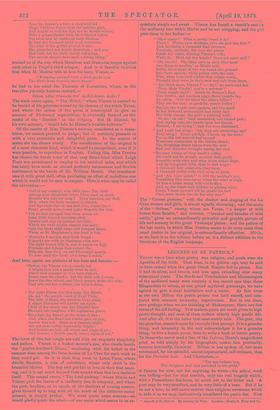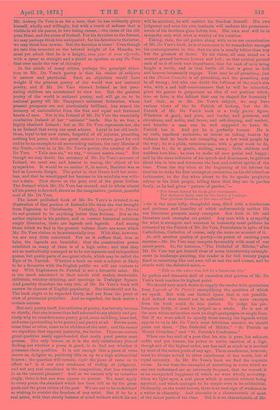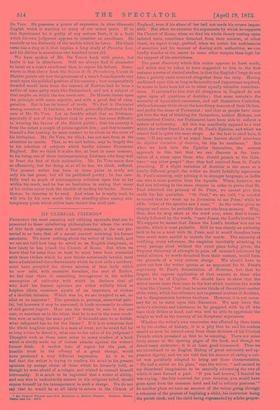LEGENDS OF ST. PATRICK.*
THERE was a time when poetry was religion, and poets were the Apostles of the Gods. That time, in its golden age, may be said to have ceased when the great Greek Empire fell to pieces. But it had its silver, and brazen, and iron ages, extending over many subsequent years. The Bards and Troubadours and Minnesingers of the mediaeval times were scarcely a less sacred race than those Rhapsodists to whom, as one grand mythical personage, we have agreed to give a local habitation and a name. As late even as our own Milton the poetic person was held sacred, and com- pared with common humanity, superhuman. But in our time, save perhaps when we are thinking of Shakespeare, there are few traces of the old feeling. Few modern poets are much given to high poetic thought, and most of them eschew utterly high poetic life. And after all, it is the latter that most surely tells. The poet, like the preacher, succeeds more by example than precept. It is a grander thing, and humanity in the end acknowledges it for a grander thing, to live a heroic poem, than to write a book of heroic poetry. To those who never read a line of the Inferno, Dante's magnificent grief, as told simply by his biographers, makes him poetically, because heroically, immortal. Milton is less spoken of, but more reverenced, for his splendid, almost supernatural, self-reliance, than for the Paradise Lost. And Chatterton,— " The marvellous boy,
The sleepless soul that perished in his pride," is famous for ever, not for anything he wrote—hie actual work was trifling—but for that terrible, only too real tragedy which, with a Promethean fixedness, he acted out to the bitter end. A poet may be very excellent, and be very little of a hero. But if he be not a hero, he will never receive that religious reverence which is, hide it as we may, instinctively considered the poet's due. Now
* Legends of St. Patrick. By Aubrey de Vero. London: Henry S. King and Co.
Mr. Aubrey De Vere is so far a hero, that he has evidently given himself, wholly and willingly, but with a touch of sadness that is visible in all his poems, to two losing causes,—the cause of the old, pure Muse, and the cause of Ireland. For his devotion to the former, we may perhaps think him antiquated ; for his devotion to thelatter, we may think him unwise. But the devotion is there ! Even though we rate him eccentric as the beloved knight of La Mancha, we must yet admit that he is a knight, sans pear et sans re'proche, with a spear as straight and a shield as spotless as any De Vere that ever made the vow of chivalry.
In the minds of many critics, perhaps the principal objec- tion to Mr. De Vere's poetry is that his choice of subjects is narrow and provincial. Such an objection would have weight if the greatest poetry of the world was not national poetry, and if Mr. De Vere viewed Ireland as her pero- rating children are accustomed to view her. But the greatest poetry of the world is national poetry, and will go on to be national poetry till Mr. Tennyson's universal federation, whose present prospects are not particularly brilliant, has erased the memory of nationalities from the free and equal and fraternal hearts of men. Nor is the Ireland of Mr. Do Vere the essentially combative Ireland of her "national" bards. She is, we fear, a highly idealised Ireland ; but as Mr. De Vere represents her, she is an Ireland that every one must admire. Loyal to her old tradi- tions, loyal to her new rulers, forgetful of all injuries, preaching nothing but peace, with one great mission to return good for evil and to be an example to all surrounding nations, the very Messias of the North,—that is, in Mr. Da Vere's poetry, the country of Mr. De Vere. "Tails cum sis," we say, " utinam nostra eases." But though we may doubt the accuracy of Mr. De Vere's account of Ireland, we must see, and honour in seeing, the object of his sympathies. It would be no matter if, in secret, Beatrice was as bad as Lucrezia Borgia. The point is, that Dante held her stain- less, and that he worshipped her because to his mind she was with- out a stain. That shows us the pure soul of the great Italian. The Ireland which Mr. De Vere has created, and to whom almost all his poetry is devoted, shows us the imaginative, patient, peaceful soul of Mr. De Vere.
The latest published book of Mr. De Vere's is devoted to an illustration of that portion of Ireland's life when she was brought from Paganism to Christianity. Verbally, Legends of St. Patrick do not pretend to be anything better than fictions. But as the author explains in his preface, and as current historical criticism amply illustrates, there are legends and legends. And among those which we find in the present volume there are some which Mr. De Vere claims to be substantially true. With that, however, we are very little concerned. For us it suffices that, true or false, the legends are beautiful; that the constructive power exhibited in many of them is of a high order ; and that they are so methodically managed as to be not separate and independent poems, but poetic parts of one great whole, which may be called the Epic of St. Patrick. Whether a book on such a subject is likely to be a favourite with the English public we will not venture to say. With Englishmen St. Patrick is not a favourite saint. He is too much associated in their minds with snakes, shamrocks, shillelahs, whiskey-drinking, and meetings in Trafalgar Square. And possibly therefore the very title of Mr. De Vere's book will narrow its chances of English popularity. But this should not be. The book ought to be regarded fairly, and not from the point of view of provincial prejudice. And so regarded, the book merits a certain success.
Not only poetry itself, but criticism of poetry, has latterly become so cloudy, that one is more than half ashamed to say plainly and pre- cisely why he considers some poetry good, some middling, some bad, and some (pretending to be poetry) not poetry at all. But we must, some time or other, cease to be children of the mist ; and the sooner we repudiate that vapoury paternity, the better. There are certain great qualities easily apprehended that really good poetry must possess. The only honest, as it is the only satisfactory plan of finding out whether a poem is good, is to find out whether it possesses these qualities. It is not enough that a piece of verse moves us, delights us, positively lifts us up to a high arithmetical heaven ; the question will remain, ought the piece of verse so to affect us ? is it our own crudeness of feeling or judgment, and not any real excellence in the composition, that has wrought in us the unusual pleasure? And as we cannot rely on ourselves singly, there is but one wise course to pursue. We must apply to every poem the standard which has been left us by the great poets and the great critics of the past. We are not to be understood as wishing to restrict the freedom of any artist. But if he be a real artist, with that steady balance of mind without which his art will be accident, he will restrict his freedom himself. His own judgment and even his own instincts will endorse the pronounce- ments of his brethren gone before him. His own soul will be in sympathy only with what is worthy of his vocation.
Taking, then, the old guides along with us in our examination of Mr. De Vere's book, he is at once seen to be remarkable amongst his contemporaries in this, that his aim is usually loftier than any but the greatest of theirs. To his vision, all men stand on a neutral ground between heaven and hell ; on that neutral ground each of us is of such vast importance, that for each of us is being fought a battle, and in that battle all that is great in hell and heaven incessantly engage. That may be all preaching, just as the Divina Comedic is all preaching, and the preaching may be all wrong ; but who can doubt the loftiness of the man's aim who, with a sad half-consciousness that he will be unheeded, gives his genius to perpetuate an idea of our position which, true or false, is the loftiest that can be shaped for humanity ? And then, as to Mr. De Vere's subject, we may have various views of the St. Patrick of history, but the St. Patrick of Mr. De Vere's book is a truly poetic figure. Whatever of good, and pure, and tender, and generous, and chivalrous, and noble, and brave, and self-denying, and modest, and humble a man can be well supposed to have, St. Patrick has it. And yet be is perfectly human. He is no rude, repellent anchorite, so intent on taking heaven by violence that he heeds not trampling on a few weak people by the way ; he is a plain, veracious man, with a great work to do, and does it ; be is gentle, smiling, sunny ; little children and maidens love him ; he tries to make all men genial and happy ; and by the mere influence of his speech and demeanour, he gathers about him in love and reverence the best and noblest spirits of the time. From the day when at the beginning of his labours he resolves to make his first attempt at conversion on his old relentless taskmaster, to the day when about to die he speaks prophetic advice to his Irish people, telling them that they are to pardon freely, as he had given " pattern of pardon,"-
" For bread denied let them give sacraments,
For darkness light, and for the house of bondage The glorious freedom of the Eons of God,"
—he is the same lofty, thoughtful man, filled with a tenderness and patience and humility of which unfortunately neither life nor literature presents many examples. But both in life and literature such examples are potent. Any man with a sympathy for what is strongest and sweetest in humanity must perforce be attracted by the Patrick of Mr. De Vere, Protestants in spite of his Catholicism, Catholics, of course, only the more on account of it. In still another quality of poetry—its power of exciting pure emotion—Mr. De Vere may compete favourably with most of our minor poets. In, for instance, "The Disbelief of Milcho," after Mr. De Vere has got himself clear of some introductory entangle- ment in landscape-painting, the reader is for full twenty pages fixed in something like real awe, till at last the end comes, and he stands with the defeated saint,—
Pale as the ashes wan left by a burnt-out city."
In pathos and dramatic skill of execution that portion of Mr. De Vere's book reaches its highest point.
We should very much desire to supply the reader with quotations from Legends of St. Patrick exemplifying the qualities of which we speak. But with our limited space that is not possible. And indeed that would not be sufficient. No mere excerpts from his book could do him justice. To judge his per- formance fairly, it must be judged as a whole. He is not of the men whose estimation rests on single paragraphs or single lines. But if we were asked to specify those among the legends which appear to us in Mr. De Vere's most felicitous manner, we should point out three, " The Disbelief of Milcho," " St. Patrick on Mount Cruachan," and " St. Patrick's Confession."
When one has said of a poet that his aim is pure, his subjects
noble and yet human, his power to excite emotion of a high, though not of the highest order, one has said as much as is merited by most of the minor poets of any age. These excellences, however, must be always united to other excellences of less worth, but of equal necessity. In Mr. De Vere's book we find the requisite union. In our time the examples of something in verse which no one can understand are so extremely frequent, that we remark it as an unexpected happiness of which we were wholly unworthy, when we light upon a real poem which is musical without being mystical, and which manages to be simple even in its sublimities. Ordinarily, as the world knows, there is no such sign of weakness in a writer as obscurity. And obscurity is a characteristic of most of the minor poets of the time. But it is no characteristic of Mr.
De Vere. He possesses a power of expression in clear idiomatic English which is wanting to many of our minor poets. If in this department he is guilty of any serious fault, it is a fault which his own judgment appears to consider an excellence. He reminds us too distinctly of the models which he loves. His blank verse has a ring in it that implies a long study of Paradise Lost, and his diction is sometimes two hundred years old.
We have spoken of Mr. De Vere's book with praise, but faults it has in abundance. Still we always find it pleasanter to insist on a man's excellence than to expose his defects. Some- where in that clever book the Soirees de St. Petersbourq, Count de Maistre points out how the greatness of a man's fame depends very much upon the political position of his country ; how comparatively dwarfed would have been the renown of Newton had he been a native of some petty state like Switzerland, and not a subject of that empire on which the sun never sets. De Maistre insists upon the principle with some asperity, and with a great deal of exag- geration. But it has its kernel of truth. We find it illustrated among ourselves. It has been, we think, pointedly illustrated in the case of Mr. De Vere. Let us frankly admit that an Irishman, especially if not of the highest rank in power, has some diffictfity in winning the favour of the British public ; that his country is from the outset a couple of points against him ; and that to ensure himself a fair hearing, he must consent to be silent on the score of his birthplace. Mr. De Vere, we think, has not met from us the attention he merits. That, as we said before, may be largely due to his selection of subjects which hardly interest Protestant England. But we think it is also due, at least in some measure, to his being one of those uncompromising Irishmen who keep well in front the fact of their nationality. Mr. De Vere never does so offensively, but for doing so at all he has, we think, suffered. The present writer has been at some pains to study not only his last poem, but all his published poetry ; he has care- fully read as much of contemporary criticism upon him as lay within his reach, and he has no hesitation in saying that many of his critics never took the trouble of reading his books. Never- theless, he deserves to be read. And when he is really read, he will win by his own worth the fair standing-place among con- temporary poets which critics have denied him until now.




































 Previous page
Previous page